Text
I totally agree with what you said about Zeniba and the scene at her place. Her quaint little house is such a stark difference from the bright and busy bathhouse, and it really adjusts the pacing and mood of the film for a short while.
Spirited Away
Spirited Away is a comfort watch for me at this point. I love Ghibli movies and this one was one of my first. I have seen this movie at least 10 times at this point in my life. I took a class at UF once about Japanese media and its connection to Western Literature. In this class, we talked about how Spirited Away is connected to Alice in Wonderland. I think this is a very interesting comparison and can be seen in a lot of ways. This story is defiantly a coming-of-age story for Chihiro. She must figure out a way to get her name back and leave with her parents.
I think control based on your name is a very important aspect. In many different prisons and death camps around the world, the first thing they do is strip you of your name. Your name is often your identity and how you can stay grounded. However, in this movie, Chihiro is stripped of her name which Is her identity. She must figure out how to get it back and in a roundabout way find her true self. This is a great setup for a fun coming-of-age story about finding your true self.
The bathhouse is my favorite part of this movie. It is beautiful and full of life. There are so many moving parts, and it feels like a real place. The more you learn about it the more you find yourself getting lost in this world. You find that these people are all entrapped and being controlled. They are trying to get money and figure out their own lives. It is also a great place for this movie to occur because it feels both friendly and hostile at the same time.
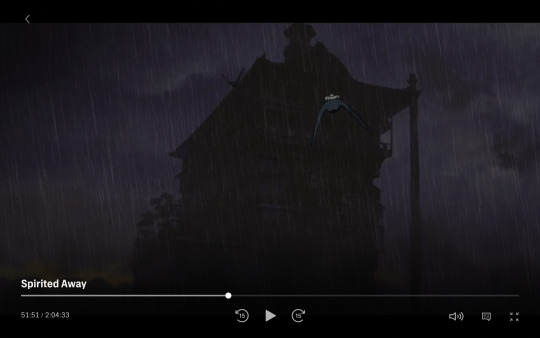
My favorite part of this movie is when they go to see Zeniba and she gives the group food and talks to them. It is such a cute part of the movie. It is very nice and quaint and connected with nature. Ghibli movies are known to be connected to nature and spirits. It takes a lot of reference from spirituality and Japanese culture. That is what sets this movie apart from so many other animated movies. There is a deep love and tradition within it. It feels so grounded yet so mystical at the same time. This is the mystique of a Ghibli movie.

This movie is stunning from all the carefully crafted shots or just the drawing style itself. You are never bored or looking at something useless. Instead, every single shot and drawing is so important. All of it is crafted with the fact of connecting spirituality with humanity. Thinning this line opens the ability to tell very powerful stories. This is something that is deeply entrenched in the movie’s art style.
1 note
·
View note
Text
Spirited Away
This was my first time watching Spirited Away (or any Hayao Miyazaki/Studio Ghibli film for that matter) and I definitely enjoyed it. I see why these films are so popular since they have a ton of charm and the animation is beautiful. I feel like the movie had some nice themes in it and is a great film, especially for children, whom I assume is the primary audience.
The film follows Chihiro and her journey into a spirit world where she loses her parents and is immediately thrown out of her element. She meets Haku, who helps her get her footing and leads her to others within this world who are willing to help her. During her time in this world she learns a few lessons, saves Haku’s life, and saves her parents, eventually being able to go home.
There are a few themes that are present in this film. Consumerism is one that comes to mind immediately. One of the first fantastical scenes we get is when Chihiro and her family are in the “amusement park” and the parents begin to gorge themselves on the food that is laid out in the only open restaurant. Chihiro asks them not to since no one is around to serve them, but they ignore her wishes and continue to eat, essentially stealing the food. This greed is shown plain as day when the parents are turned into pigs, which we find out later are meant to be eaten by the spirits later on.

We see this greed again with No Face, and all of the spirits obsession with gold in the bathhouse. Everyone is incredibly eager to get their hands on some gold that they rush to No Face’s side begging to be blessed with gold, to the point where some people are even eaten because of this.
Another theme that I thought was interesting but only touched on momentarily was pollution. Though while watching the film I only caught one instance of this theme, after looking into it I found a second one. The first and most obvious was during the “stink spirit” ordeal at the bathhouse. This spirit was river spirit that became full of human garbage, as we see when Chichiro removes the stake that was stuck inside of him. Once it is pulled out, loads of human trash flood out such as a bike, a refrigerator, and numerous other pieces of pollution. The second I found after looking into this theme within the film. Haku is the spirit of the Kohaku river, which was destroyed in order for apartments to be built. I must have missed the line where this was discussed in the film, since it also seems like a pretty obvious point on this theme.

Overall, I did like the film, but don’t feel like it had the same effect on me as a lot of other individuals. I thought it was cute, beautiful, and had a good message, but I think some of the whimsicalness was lost on me either because this was my first viewing after being so exposed to the style on the internet for years, or maybe because I was exhausted when we watched it. Either way, the film was good, I’d watch it again for sure, and would love to explore more into Miyazaki’s films.
3 notes
·
View notes
Text
I totally agree with what you said about the costume design and symbolism. It is VERY in your face to the point where anyone would notice it, and I think that’s the point. With how ridiculous and convoluted the movie got, I think having the constant color reminders helped to keep track of who’s who and what’s going on in general.
Sukiyaki Western Django
I have no idea what to even say about this film. It was definitely a wild ride. Dr. Smith, why? Why did you pick this movie?
Having read the Tale of Heike, I see the connections back to the war tragedy. The use of red and white leading back to this tale was a successful costume design choice. While all of the color symbolism is slammed in your face to where it is impossible not to notice, it did create a cohesive effect to the film and helped viewers keep track of who is who in the mess of a film.

As someone who hasn’t watched westerns, this film was just very absurd and bizarre and from what I’ve gathered from the class - even if you have watched westerns it still doesn’t make any sense.
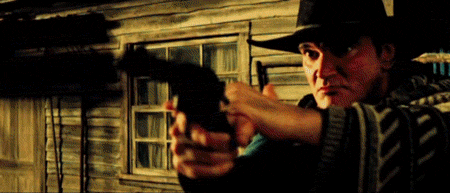
I’m already running out of things to say about this film… It honestly just seems like a drunk or high idea by both Tarantino and Miike. The choice to make the film in English almost made it more absurd. It definitely fits Tarantino’s genre, though I can say I am not as fond of this film as I am other films of his such as Pulp Fiction.
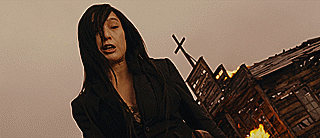
Ben Ten was a fun little twist, though I do think it odd that if she was this powerful, why didn’t she do anything to save her daughter-in-law as she was dying for 30 minutes. Overall, I felt this film handled women terribly. While Ben Ten is shown to be a “cool heroine,” it only seems to appear that way so that Tarantino can get a few more scenes and so that everyone can end up dead. I felt like all the women shown in the film came from some old man’s sexist pipedream. It was weird and honestly kind of demeaning - definitely a film that makes me hate depictions of women written by men in media even more.
One thing that I like to use to decide whether something is putting female character’s in is the “Hawkeye Initiative,” that came to use in comics for showing when art of female characters were overly sexualized. Essentially, artists replace the female character with Hawkeye and see the pose, clothes, and connotations of the final image are being used to over sexualize women. Here’s an example with Mary Jane:

In regards to Sukiyaki Western Django, I’d like everyone to imagine all of the character’s genders as swapped. Now reconsider all the scenes of violence and rape against the women in the film and all the ways that the portrayal of the female characters as passive beings going along with such violence ultimately hurts women. I think if all these scenes were done to men that the audience would react even more grossed out, which is a shame that these gendered differences still exist in film media portrayals. However, I was quite happy that it seemed those who watched the film in class with everyone also found these scenes terrible and audibly reacted as such, which gives me hope that these issues will be solved in the future.

But seriously Dr. Smith, why did you pick this film? I need to know
5 notes
·
View notes
Text
Sukiyaki Western Django
Sukiyaki Western Django was by far one of the most entertaining movies we’ve watched for this class. It was wacky, ridiculous, and a fantastic movie to make fun of while watching with a group. That being said, I would never in a million years watch this film by myself because as a whole, it is just bad. I genuinely had a good time watching the film with the class, but don’t think that same enjoyment would come from a subsequent viewing without watching it with a new group to laugh with.
From the very beginning the movie wasn’t taking itself seriously at all, and I loved the stupid generic western painted set for the opening. While on the topic of set, I did find the mixture of classic “old west” style mixed with generic Japanese architecture to be interesting, and surprisingly I didn’t really find it jarring or taking me out of the film at all.

I enjoyed the dumb sound effects that accompanied a lot of the action such as the generic whistle sound when something was falling, as well as just the goofiness of a lot of the movie in general.
The movie obviously took heavily from the clichés of spaghetti westerns. To start, we have the most generic of all the tropes, “The nameless hero” who wanders into a town and saves them from the outlaws/bandits/other bad guy. The use of the metal under the clothing to deflect bullets is another that I noticed. I found the barrel rolling through town at one point hilarious since it’s normally a tumbleweed. I like the use of Quentin Tarantino as the token white character since a lot of old west films tend to have a token Native American in them, I thought this was a funny play on that.
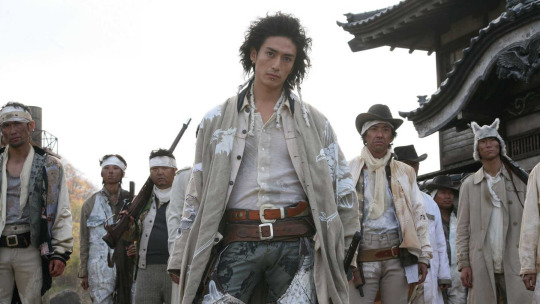
The plot felt like it had a lot going on at all times with the two warring groups, the sheriff switching sides, the story of the Genji girl/son/mother/grandson, the old man in the mountain, the mention of Bloody Benton (who was the grandma), and Tarantino’s character. Just a lot happening that I definitely wasn’t keeping track of it all. The symbolism of the red and white was very on the nose (which was the point I’m assuming), but when the snow started falling out of nowhere I instantly knew that it was so they could splash blood on it.
Overall, I don’t have too much to say about the film as a whole. It’s a giant spoof on the western genre, it doesn’t take itself seriously, and it’s fun to watch with a group to laugh at. Is it a bad movie for that? I don’t know. It definitely entertained me but I don’t think it’s a “good” movie.
0 notes
Text
I loved the relationships that were built in this film. I strongly agree with what you said about the subversive idea of Sentaro finding a mother in Tokue as opposed the the standard “father figure” idea being the only relationship. The line in Tokue’s cassette tape about how Sentaro is the same age her child would have been absolutely hit hard, and I think this film did an amazing job of having a beautiful film with a bittersweet, lovely ending.
Sweet Bean (2015)
I was worried I would find this movie hard to watch due to its slow pacing and minimal dialogue. I watched it at like 12 am and I was really afraid I would fall asleep. But this movie actually managed to not only to not put me to sleep but it actually kept my interest the whole way through. I don’t think I would have wanted the pacing to change or for there to be more dialogue, it fit perfectly that the movie felt shorter than it really was once I finished. I also think that despite me being able roughly guess the plot within the first 15 minutes of the film, the emotional impact was still strong.
I also live laugh love a found family based story. I think often this is done with father figures, so having Tokue become a mother figure was a welcomed change for me. I think the dynamic between Tokue and Sentaro is fleshed out well, showing how both of them were the missing piece of human connection they needed. But the inclusion of Wakana is what made it more interesting to me. It wasn’t simply a man who lost his mother finding his mother in Tokue, it was a whole family that each helped one another grow in a way that couldn’t have been achieved with just 2 of them. Wakana I believe did look up to Sentaro as a sort of father figure as well, given that we never saw or heard about her father, I think she was looking for that in him. They all 3 were misfits, though Tokue suffered the most from societal pressures, and the only place they were safe from judgment was with one another. This really showed through when Sentaro refuse to fire Tokue and when they visted her at her home, both Wakana and Sentaro did not seem to be afraid of the patients.
This movie goes into the sadness of ostracization, Tokue was outcasted since she was young. The times she seemed the happiest was when she was serving people, talking and interacting with them. It is a small thing we do every day, but we can easily take for granted. This contrasted with Sentaro’s character who had the shop and in the beginning was wanting customers to hurry and leave. I think that’s why the dorayaki shop was a great place for the film to be based around. Small shops like that are known more so for their customer service, and social nature. Everyone usually knows and loves the people who work there. It is an inherently social and more intimate space than larger establishments or even small shops that sell more goods.
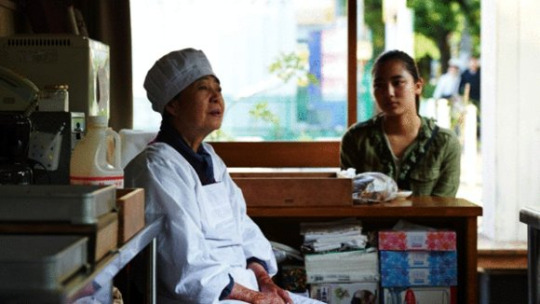
A lot of freedom symbolism in this film as well. The bird in the cage which represented all 3 of the characters. Wakana who could not go to high school and work toward the future she yearned for, Tokue who was outcasted her whole life, and Sentaro being in debt and stuck working for someone he seemingly hates. In the end they found love and compassion with one another and freedom once Tokue died, they both began to take steps toward a life they could enjoy.
The nature establishing shots were stunning and after we find out that the leprosy patients have trees planted over their graves, these long nature shots make more sense in the film.
Overall, I loved this film. My mother and I bot shed a few tears and wanted to try dorayaki by the end of the movie.
2 notes
·
View notes
Text
Sweet Bean (2015)
I’m not entirely sure what to write about Sweet Bean in all honesty. First of all, I really loved the movie. I think this style/genre of film is my favorite, sort of slice-of-lifey/personal growth stories really do something for me and destroy me emotionally. It probably doesn’t help that I just watched a production of Falsettos earlier today which also has an emotionally charged bittersweet ending.
Starting with the characters, I really loved the main three. They were all so genuine and sweet, even if they had their own issues going on in their lives. Despite his somewhat cold or grumpy exterior, Sentaro was such a nice man. I loved that he truly cared about Wakana and Tokue, so much so that he risked the business by keeping Tokue on for so long and letting her work the window. Tokue was the sweetest old lady in the world and I love her. I really hope when I’m a grumpy middle-aged man I have a nice elderly lady like her to help me get my character development. In all seriousness, I thought her outlook on the world was so nice and refreshing. Way too often do we ignore nature and take it for granted, but Tokue sees the beauty in everything. Trees, the moon, and even just simple youth. It’s truly such an amazing outlook that I strive to have one day. Wakana being the youngest doesn’t seem to contribute as much as these other two, but she does have a very sweet relationship with Tokue and Sentaro, and I think the fact that she learned just how destructive rumors can be and how fast and far they spread is a hard lesson learned.

The main theme I got from the film was to enjoy the freedom that you have. Everyone in the film has a burden or something holding them back. For Tokue, it was her illness and disfigurement that kept her locked away for decades. For Sentaro, it was the debt he owes for his past mistakes. For the younger girls, it’s simply school and the pressure of it. While these are all drastically different in severity, I think it’s important to take into account the life experience each group has and how much these burdens weigh on them at this point in their lives. Tokue has lived like this for so long, that she can now move through it and see all the beauty in the world. Having been hidden away for so long, her freedom feels so much more satisfying, to the point that every little thing is appreciated. Sentaro still feels trapped by his debt, and as such, feels like he doesn’t have that freedom. His life is ruled by this feeling, which is why at the beginning of the film he is so sad and lonely. It isn’t until his experiences with Tokue and Wakana that he is able to see the world in a similar way to Tokue. By the end of the film, it is implied he has moved on from his burden and is now selling from his own stand. We hear him proudly (and happily) selling his dokayaki out in the sun.
This is a film that I will definitely watch again. I enjoyed every moment of it, and god was it a change from Ringu and Pulse. If nothing else, after watching those two followed by this film, I realized that long takes of establishing shots don’t feel slow and like a waste of time if the movie is good.
3 notes
·
View notes
Text
I completely agree with you about how the film dragged, definitely wouldn’t watch again.
I do agree that the use of darkness was effective in some situations, but I did find there to be a few times where the movie was so dark that I had a hard time seeing what was happening on screen in parts where that shouldn’t be the case. Not even situations that were supposed to be scary.
Pulse - Kiyoshi Kurosawa

Hoo boy, did I find Kiyoshi Kurosawa’s film Pulse to be quite a boring film. I am honestly not sure if this is a hot take or not but I find this to be the movie that has dragged on the most of all the films we have watched these last 2 - 3 months. Although I can openly say that I would probably not watch this movie again, I think I can be open towards the things that were decent and maybe things that I simply didn’t catch that would have made the viewing experience a better one for me.
For starters though I found the plot to be somewhat dull I would be lying if I said some of the scenes in the film were not pretty creepy. The first creepy scene in the film is when we witness the hanging of Taguchi and the placement of the camera as well as the lighting did make that scene in particular pretty eerie. Speaking on the lighting I will also appreciate the mise-en-scene in the film because a lot of what was very interesting. The use of darkness made a lot of the figures or “ghosts” appear like silhouettes just inching closer to the audience. This absolutely is a much better approach to me as opposed to cheap and undeserved jumpscares. Another design aspect that I found myself appreciating was the sound design. In particular I was a huge fan of the soundtrack where some of the scarier parts were accomponied by this operatic singer that would remind me of the soundtrack of the 1990’s video game Parasite Eve. The use of silence is also done well which has made me realize that I found that tactic to work much more over the slowly building violin right before a jump scare.
My biggest issue with the film was the plot and the pacing of the film. Even while reading through my notes I found myself becoming more and more jaded with the film as it went on. Pulse really did feel like it was dragging so much more than it needed to and towards the end I found myself so frustrated with some of the decisions made by the characters. I am always open to the idea that there was something that I missed that gives the film more meaning but for this film in particular I really do not want to watch it again. I appreciated the theme of depression and this fear of being alone, but I just don’t think the plot really did much with it in my opinion, and if it did I was just so drained about an hour into the movie that I was unable to process anything.
Final Verdict:
I was not a fan, comparing it to Ringu I can say I found this movie visually more interesting but I just could not keep myself focused due to such an uninteresting plot. I did feel there was something there but I honestly do not think I’ll be watching it again to find out what that is.
1 note
·
View note
Text
Pulse (2001)
I really am not a fan of horror movies in general, especially ones that are monster/ghost related, so Pulse really didn’t do anything for me. I found it incredibly boring, felt like it dragged on for so long, and there was a lot of time where there was very little happening. Not even just slow scenes, but just extra long shots that could have been cut half.
It seems that the Japanese horror movies (at least the two that we watched in class) are a lot slower paced than those of Hollywood, and that is perfectly fine. I love a good slow burn movie, for example the crime drama Knives Out has a 2h10m runtime and I love it, but for the slow burn effect to work I have to actually get invested and like the plot. I can’t say that Pulse got me invested at all. I didn’t hate the characters as much as I did in Ringu, they didn’t seem to make such stupid mistakes in general, and a lot of them died by happening to see the forbidden room or trying to help their friends, so that’s a plus.
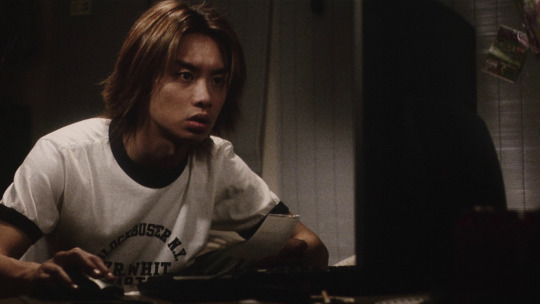
The only theme I could sus out for this film was “technology bad”. There was some talk about a lack of connection and the ghost phantom thing making people feel extremely lonely. All of this happened based around the internet/computers, so the connection I made is something along the lines of technology leads to isolation of individuals, even if there’s a promise of connection through it. Other than that, the film was incredibly boring and a bit confusing. Everyone just kinda died? Like the whole world? I’m not sure if I missed something or that was just out of the blue like it felt. By the time we got to the end of the movie I had completely forgotten it started with that opening boat scene, so when it finally got there I realized just how horribly this film dragged.
I will admit that the scene with Harue towards the end where she’s back in her computer room and sees herself on the screen before going to the door was really cool. I thought the way it was shot was really interesting, and I guess if I was invested in the story or was someone who was scared by the film, it would have been a super tense moment. Realistically though, that’s the only part of the film that stood out to me in a positive way.
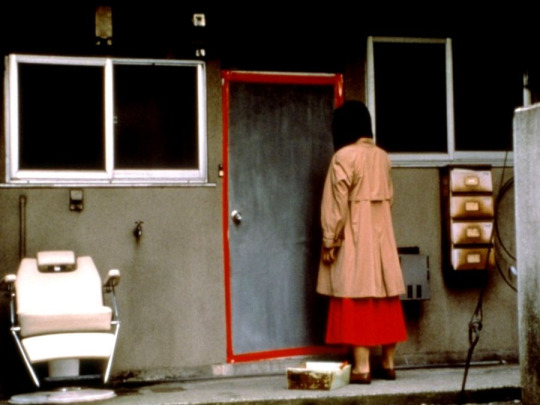
Again, I think that the main reason I didn’t like this film was because I don’t like horror movies in general. I think if I did, I would have been able to get invested in the plot and the plight of the characters, and maybe would have better things to say about it. Between this and Ringu,I think I preferred the latter. At least that one was more entertaining for me, it felt like more happened and I could at least hate the characters. Pulse just felt so boring and I couldn’t help but be disinterested and keep checking the time.
I think these two movies also both suffer from the time they were made. I don’t mean this from a technical standpoint, but the fact that the idea of chain mail, copypasta, “this thing will get you if you see this” type horror like Slendman, Jeff the Killer, and Momo challenge is something I’m so jaded to now having been around it my whole youth on the internet. I can see the idea of this being way more terrifying for adults/teens when the internet was still young and something like this wasn’t as common.
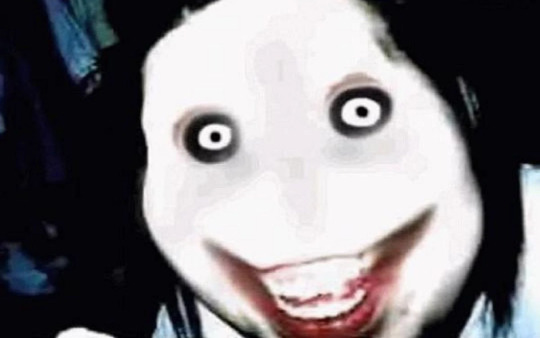
All in all, not a fan.
1 note
·
View note
Text
This is a really interesting dive into something I never would have thought about! I particularly find the analysis of 54-4226 cool. I’m not familiar with the Japanese language so this is something I never would have been able to notice, but I think the use of numbers like this that are considered bad or unlucky could definitely be intentional
Ring....
Well… that was scary. I thought it would be worse but it was still quite scary…
I don’t really want to look up photos of this movie and accidentally run into frightening screencaps, so no pictures in this blog post. However, because I wasn’t looking at the scary things, I was instead focusing on the use of numbers in the film which ended up being quite interesting.

Numbers:
B4
Let’s start off with the first number in the film: B4. Honestly, this number has two interpretations - one in English and one in Japanese. In English, the hidden meaning is quite clear: B4 = Before. Yet, it isn’t until the end of the movie that the viewer realizes that this is a hint into where the body is since it is found under the building labeled B4. The Japanese meaning takes a bit of thought but, I believe it could be a play on the number “24″. In Japan 24, is considered an unlucky number because it sounds like “two deaths” (ni-shi). 4 will come up a lot in this film since it is the most unlucky number since it sounds like “death.”
54-4226
Breaking the numbers into parts, 54 is the first combo in this sequence. While this is technically a stretch, this could be a multilingual joke on “go die” with 5 = go and 4 = shi.
42 is actually a restricted number in japan since it sounds like “to die” and is never used as the last numbers on a license plate (note that these numbers appear in the middle to make it plausible)
26 is an interesting last number combo to appear since 26 in numerology is typically associated with doomsday. This is because 2+6=8 and 8 is thought to be the number of disaster.
7:01 (some time after seven)
The main protagonist’s time of watching the film and predicted time of death is tied to the number 7 for the number days of the week, which are also the days she has left.
77-3265
At the end of the film, the license plate on the car changes to show this one which is absent of the number 4 - predicting no death is on the horizon. Other than the absence of the number 4, I think the 77 is supposed to bring comfort and good fortune at this point in the film.
6 notes
·
View notes
Text
Ringu - Nakata
Ringu is a horror/thriller film from 1998 directed by Hideo Nakata. From what I’ve heard about it before watching it’s one of the big horror movies, and is generally regarded as a must see. I’m not a huge fan of horror movies myself, I tend to find them a bit silly and the protagonists tend to always make really stupid choices. Wow was this movie no exception.
I was bored for the majority of the runtime of Ringu. I couldn’t get very invested in the story for some reason. This may be because it is such a famous movie I already knew the general plot or it may be because I hate the characters. For real, Asakawa really made me hate her so early on and so easily. I get it, she’s a journalist and she wants to find out about this mysterious tape that killed her niece. So what does she, the single mother do? She watches the tape that killed her niece. How dumb are you? In my opinion, even if you don’t believe in superstition, that’s dumb as hell. After that, what does she do? Shows it to Takayama. Why? They want to solve the case, but I just can’t get over how dumb this is. The final nail in the coffin was the fact that she just left his tape lying around the house apparently? Like, dude, you have a CHILD. I’m starting an Asakawa hate group, you’re all welcome to join.
I thought the flashbacks and Takayama having some weird PSI powers was strange, but it didn’t take me out of the movie. If there’s a killer tape with someone’s rage trapped in it, I guess I can believe that people can have psychic powers. After all, that’s kinda what got the Shizuko and Sadako in their situation to begin with. The flashbacks themselves felt kind of weird, especially since Asakawa seemed to get transported into them instead of them just seeing them, but this wasn’t a major issue for me.

One thing I really didn’t get was the point of the whole “storm keeping them on the island” plot line that lasted for a total of 3 minutes, had no real impact, and just kinda felt like a filler bit. Yeah, I guess it showed the old mans change to be willing to help them, but like, ultimately it did nothing different then if they had just left easily.
I do want to say that the scene with Sadako coming out of the TV was actually pretty good. It looked pretty good and was definitely creepy. But this also leads me to what I think was the ost annoying and frustrating thing about this movie as a viewer. Earlier in the film Asakawa interviewed a few young girls about the tape. We get some basic information about what happened and that’s it, not much we as an audience didn’t already know. HOWEVER, apparently there as more information that she got that we just didn’t, and it plays as voice over at the end when Tamayaka dies. It mentions that the only way to get rid of the curse is to copy the film and have someone else watch it. So it’s implied that ASAKAWA KNEW THIS? One, wtf, that feels like such a stupid copout. Two, Asakawa is an idiot. Three, now she’s gonna go kill her dad, so that’s fun.

Ultimately, I think if I didn’t hate the main character I would have enjoyed this movie. I just felt it was boring and since I didn’t care about Asakawa I couldn’t really get invested. The very beginning of the film was good, so I’m really thinking the character issue is what killed it for me. At least the movie looked nice from a cinematography standpoint.
4 notes
·
View notes
Text
I definitely agree with you about the mental whiplash (great term btw). While I did enjoy the film as a whole there were times where it felt like it wasn’t sure what it wanted to be. Whether that was a deliberate choice or not I’m unsure of. It felt like there was a lot of extra small things going on that made the plot feel a bit convoluted, but the main story itself was still very strong with likable characters.
Swallowtail Butterfly - Shunji Iwai
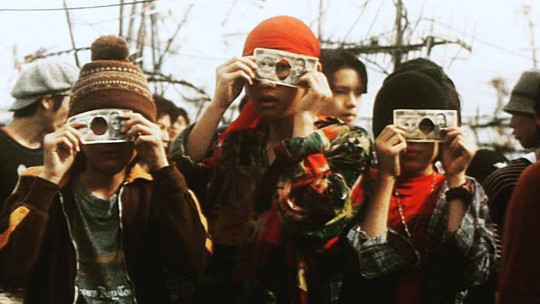
Swallowtail Butterfly by director Shunji Iwai was an interesting movie to watch, it had many aspects that I was a fan of and other parts of the film I was just a bit confused by. I think most of the confusion stems from the fact that the film appears to have so many different plot points that putting it all together took some effort on my mind. There was the obvious main plot
of Glico and Ageha and the bond that they built, both coming from what seems to be difficult pasts. However, throughout the film there seems to be other plot points which carry the same amount of importance which made the movie seem like it had multiple genres all at once. There was the journey of Ageha and Glico, then there was the band that was built which made Swallowtail Butterfly appear to be one of those films about a band going through the trial and tribulations that bands go through, and then there was the Yakuza like issues when it came to Ryo Ranki in which I felt was never really touched up on. It was clear that there were these groups of gang members who really wanted this cassette that had this tape which allowed them to make counterfeit money but I would have liked to see Ryo Ranki have more time in the film and maybe a scene where he connects with the rest of the cast.
A major part of the film that I found really interesting was set in this near future environment where it seemed there was a blend of cultures all placed in Japan. I thought it was really interesting how it seemed the general consensus was that English was spoken by everyone so there could be a means of communication between everyone. I will say I think this made it a bit harder for the actors to act a bit more naturally. I don’t think the acting was bad at all by anyone but I did think there may have been a few moments where they came off a bit awkward, but it was mostly due to the language. This is totally fine of course, speaking a non native language is already not an easy task so I can only imagine having to juggle acting and speaking in a different language is not any easier.
Overall, I was a fan of the film. I don’t think it was very difficult to follow along and I for the most part understood the key moments of the film. I just did have moments of mental whiplash when the movie seemed to be juggling more than one identity when it came to its genre.
3 notes
·
View notes
Text
Swallowtail Butterfly
After sitting on Swallowtail Butterfly for a week or so, I still have mixed feelings about it. While I did enjoy my overall watching experience and was entertained by the film, I also felt like there was a lot going on at all times and the movie felt disjointed from itself at multiple parts. I felt like the plot as a whole was enjoyable and not too complicated, there were a few parts that felt like they were from a different genre or movie entirely, or that felt so insignificant in the moment that I forgot about them until much later when they were relevant again.
One thing I really liked about this film was the use of the multiple languages. It sort of surprised me when the film opened with English dialogue, and then throughout the film there was the use of Japanese, English, and Mandarin. It opened up the film to a lot of topics about race, ethnicity, and even class based off of what languages an individual knew.

Another thing I really enjoyed about this film was the overall message about chasing ones dreams too carelessly having the ability to hurt yourself and those closest to you. We see the group manage to get out of the slums by literally printing their own money, which gives them just about unlimited buying power. They move into the city and buy a club, and shortly after that, Glico gains traction as a singer and eventually gets signed to a label. At the same time, the label arranges to have Fei Hong deported as to not interfere with Glico’s stardom. All of this disrupts the group greatly, causing the band to leave, and eventually Fei Hong dies in prison.
The thing about this film that I’m not sure how I feel about is the weird feeling that it changes genre occasionally. The scenes in the slums feel so different from the scene where they find the tape in the body, which feels way different to the scenes with the Ranki and his henchmen murdering other crime lords. I won’t say I hated it or it took me out of the film too much, but it did feel weird.
Overall I did enjoy the film. I found it to be interesting and it had a lot of good moments. There were some parts that made it feel a little convoluted and confusing, which I think on a rewatch might be solved, but with my initial viewing I left with a lot of questions.
1 note
·
View note
Text
I definitely agree that the sunglasses represent something to do with his criminal side, as he only wears them when dealing with the yakuza or other violent activities, however, I didn’t catch that he’s wearing them in the final scene with him and his wife. Looking back I feel like that’s a dead giveaway that something is going to happen for sure, even if we don’t know what at the beginning of the scene. Great observation!
Hanabi - Takeshi Kitano
For this discussion post I will be discussing the movie Hanabi (Fireworks) by Takeshi Kitano. Hanabi was an interesting movie that revolved around ex-police officer Nishi, as he struggles to accept the fact that his wife is dying, the trauma of his comrades dying, and his misadventures in the criminal underworld.
The first thing I noticed in the movie was the fact that Nishi was almost always wearing sunglasses. He would even be wearing them inside sometimes, which is just really weird. My guess is that they had some kind of symbolic meaning, perhaps when he is wearing his sunglasses he is putting on a persona or is hiding his true self.
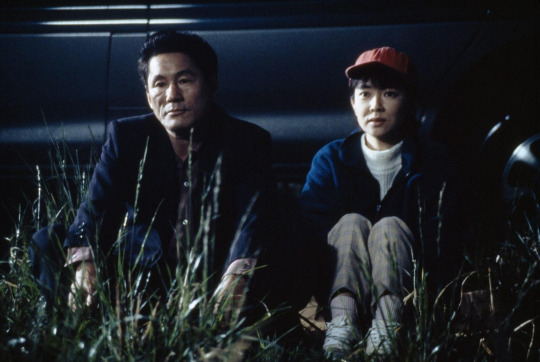
You can always feel this kind of weird dissonance when watching the relationship between Nishi and his wife. The fact that he planned this trip and spent a bunch of time doing things with her shows that he cares for and loves his wife, but on the other hand you can clearly see the distance between Nishi and his wife. This culminates in the scene where it is implied that he shoots his wife and himself with the last two bullets in the revolver he got from the yakuza thug.
You can tell something bad was going to happen for two reasons, one was the suicide painting that the guy in the wheelchair drew, and the other was that he was wearing sunglasses while spending time for his wife for the first time. When looking back through the film I checked to see where he was wearing his sunglasses, and he never wears them with his wife until that day, so you knew something was up. This really built up the tension in a subtle way, and since the day goes on for so long it just prolongs this uneasy feeling.

You also get this feeling when he is talking to his old coworkers, as the interactions with them just feel really awkward. Things must have not been the same after the death of Tanaka, and it broke the social dynamic between Nishi and the crew. The dissonance may also be due to Nishi’s violent streak, where they mention being scared of him when he lost his temper and unloaded his gun into a dead body. In the past when he’s at the sushi restaurant with one of his coworkers, Nishi still has the glasses off, so he is still his true self at this point. You can tell by the fact that his interactions still seem genuine at this point.

Nishi also does not were sunglasses when he is preparing for and carrying out the bank robbery, and when he confronts the yakuza for the final time. I think this is because the excitement and thrill of it helped him to feel alive and brought him out of his sadness and disillusionment. This and the time spent with his wife were the only times he felt like himself, so they show him without sunglasses.
The fact that no one comments on Nishi wearing sunglasses pretty much all the time leads me to believe they are symbolic, and that Nishi isn’t actually really wearing any literal sunglasses. They are just a way that Kitano communicates to the audience that Nishi isn’t his true self at that moment, and that he is putting on a persona.
I also really liked the scene where the guy comments on Nishi’s wife watering dead flowers since his quote, “It’s no use watering dead flowers”, pretty much sums up the problem Nishi found himself in with his wife. That’s probably why it made Nishi so mad, to the point that he beat the guy up for saying it.
There were also all the paintings done by the guy in the wheelchair, which some were obvious representations of what was going on in the movie, others were predictions of what would happen (such as with the suicide painting), and there were others where I was not sure what they meant. There were a lot of paintings of ‘flower animals’, I’m not sure if they were supposed to mean something? I’m not super familiar with flowers and what they represent, so this part kind of just went over my head.
As for my thoughts on the film, it was honestly very interesting. I was constantly on the edge of my seat, trying to figure out Nishi as a character, understand the symbolism, and anticipate what crazy thing would happen next. The soundtrack for this movie was great, and had this kind of jazzy feel to it. Nishi was also just pretty cool, the fact that he was able to take down the thugs with no effort was so awesome.

3 notes
·
View notes
Text
Hana-bi - Takeshi
Hana-Bi, directed by Kitano Takeshi, was a really interesting film that followed an ex-police officer turned criminal in order to take care of and spend time with his dying wife. I really enjoyed watching this film and felt like a lot of the shots were well done. One in particular that stood out to me as shocking but effective was the scene where Nishi goes to use a lighter and when he lights it there is an immediate cut to the gunshot.
In this film, I really liked seeing the relationship between Nishi and his wife, Miyuki. At the beginning we get the sense that he rarely sees her since she is currently hospitalized and he works a lot. His fellow detectives often ask about her and if he has seen her, which shows that they care for them, but unfortunately Nishi works too much. We learn that he’s borrowed money from the Yakuza to pay for his wifes treatments, which ultimately didn’t help her, as the doctor says that there isn’t anything more they can do. I feel like that must be such a slap in the face. I found it interesting that once Nishi is no longer working as a detective, he quickly turns to crime to pay off the Yakuza and get money to be able to travel with his wife. We see before this that he has a violent nature, but this surprised me for sure.
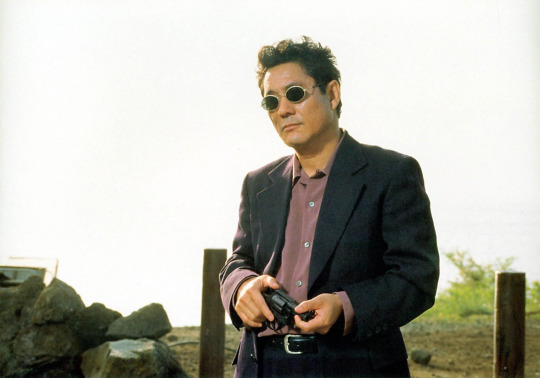
I also enjoyed seeing the two sides to Nishi. The one where he is in the company of people he cares about such as Miyuki and Horibe in which he is calm, mostly quiet, sweeter, and the one where he is facing adversaries and doesn’t hesitate to be incredibly violent towards them. We see this multiple times with yakuza members repeatedly attempting to get him to pay up, bring him to the boss, etc.
On the contrary, the scenes with Nishi and Miyuki are so sweet. I found the scene where Nishi brings dessert and Miyuki takes both of them adorable, and the scene where he is “guessing” the cards while they're in the van was one of the cutest things I’ve seen in a movie in a while. It’s bizarre to see this wholesome moment after watching Nishi take someone's eye out with chopsticks. We also see how much he cares about other by him sending the art supplies (a very large and expensive amount I might add) to Horibe in order for him to have a hobby and an outlet after being paralyzed and attempting suicide.
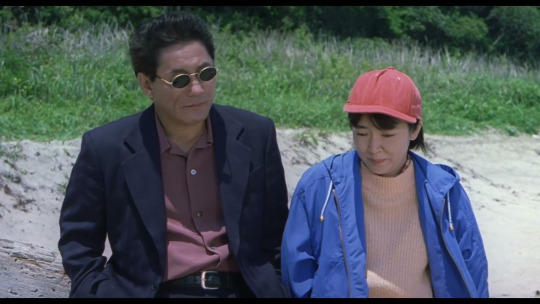
The ending of the film makes all these previous moments that felt wholesome between Nishi and Miyuki feel bittersweet at best. As an audience we already know that Miyuki doesn’t have much time left, so we’re aware that this road trip is a sort of goodbye/one last hurrah. However, when the two officers find the yakuza bodies and know that it was Nishi, then come to arrest him, we see the consequences of all of his actions come down. When he loads the two bullets into the revolver it becomes apparent what is going to happen, especially when he asks for “one more moment”. Honestly, when it starts panning to the sea, I thought maybe the film was going to leave it as just heavily implied, but much like the firework scene, there is a long pause building up anticipation, a wait, and then a bang.
0 notes
Text
I also really liked the boxing scene towards the end. I think it had a good amount of humor, but also did have a good point to it. To me, the boxing represented the closed off-ness of the father, and to an extent also his son. In this scene, I felt like it demonstrated that the father might be able to beat Sugihara, but it is only because he is unwilling to be open.
Go
I loved this movie!! It was such a fun watch and I also felt it presented the absurdity of the discrimination that “non-Japanese” populations face in Japan, and did not really hold back in making its message clear. I thought it was going to be a Romeo and Juliet adaptation, but was very pleased with what it was actually about.

Being a Zainichi
The issue of identity and nationality are the main focus of this film, despite Sugihara occasionally reminding us that this is a love story. Sugihara’s status as a Zainichi affects everything he does and almost places limits on what he can and can’t do. He says he has dreams of becoming a doctor or a lawyer, but he also immediately says those are impossible when talking with Sakurai. He and Jong-Il talk about college and reaching high places in the workforce, but Sugihara just simply doesn’t believe in it because he feels he’s not in a position where those dreams are attainable. He also attributes his inclination to fight and to be a delinquent as attributes of being a Zainichi.
However, Sugihara eventually realizes that his status within Japanese society does not represent something tangible, or rather, that the box he has been put into doesn’t define him or have any real meaning in the grand scheme of things. He breaks himself out of this box in many different ways, sometimes without realizing it. For example, when his old classmate asks him to help get revenge for Jong-Il, Sugihara refuses because violence (something he associates with being Zainichi) is not necessary and is just a mindless, unnecessary choice to make. He also decides to go to college, which he previously saw no point in. The only thing holding him back from doing all of these things was the internal prejudices he had towards himself, and by the end of the film, he was able to overcome these obstacles.
I also liked that he had a lot of other characteristics than just being violent and boisterous. He was so focused on being a Zainichi that he didn’t really focus on how he enjoyed reading and learning, or how he liked music and was really excited to go to the opera. Considering how he was reading at a club, these characteristics were pretty obvious to the audience, so it was really nice to see him decide to go to college. (It was also nice to see him decide to pursue higher education because Jong-Il believed that he could… This is slightly off topic, but I gasped when he was stabbed and was very upset.)
Being a Boxing Referee
My favorite scene is probably when Sugihara gets horribly beaten up by his father near the end of the film. However it is not because of the beating, but instead the pure enthusiasm of the taxi driver going above and beyond to celebrate the father’s win.
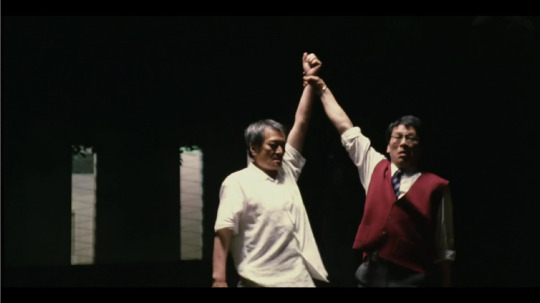

It’s just so funny, I mean look at him. I love how excited he is that his generation’s representative was able to just overpower the younger generation.
To be more analytical, if we look at it from a modern perspective, the normalcy of physical abuse towards children as punishment really stands out. However, from the point of view of these particular characters, boxing and fighting have been how they come to an understanding. Even though the father beats his son—and makes the point that you have to do whatever you can to win—he understands that Sugihara may have a point in regards to the discrimination they face. They both consider each other’s perspectives and recognize the importance of both, bringing them closer together. It was a nice moment if you overlook the blood.
5 notes
·
View notes
Text
Go - Isao Yukisada
Admittedly, I’m a sucker for a good coming of age story, and Go fit the bill for that pretty well. The story itself didn’t seem remarkable to me, but at the same time I don’t think it was super generic either. I think the film touched on some good themes such as the discrimination of Korean-Japanese (which I wasn’t aware of), as well as some issues with family and being emotionally open. As much as I did enjoy the film, I found that it dragged a bit in the first half. Up until about an hour in I did find myself checking the timestamp a few times to see how far I was, and I think that’s just a symptom of setting everything up being inherently slower than when actions start to take place and things fall apart.
I think the most obvious and main theme that was touched on in this film was discrimination, and in the case it was prejudice against Korean-Japnese within Japan. This issue is addressed directly and is a driving force for the plot, so it’s not exactly subtle with it’s undertaking. While I think this is an important topic to address, I think with how open the film was with it there isn’t much I can say that would be insightful, so instead I want to mainly talk about a different theme that stood out to me, which is the idea of emotional openness (or lack there of).
When we see Sugihara’s father teaching him to box, he mentions that while you’re within your circle you are safe. This to me stood out not only in terms of boxing, but from the idea of being open as a person. Sugihara’s father is a great boxer, and the only person in the film we see Sugihara lose to, and when he does, he loses terribly. Sugihara’s father also seems incredibly closed off emotionally. He keeps people out of his circle, and in turn, keeps himself safe. We get the sense that Sugihara himself is pretty closed off, only allowing a few select people in, and in each case, we see that this ends up hurting him. In one way or another, the two main people he lets in (Jong-Il and Sakurai) end up as a source of grief. By the end of the film, we see both his father and him start to be more open and accepting with a willingness to “let their guard down”.
Overall, I did like this film and would probably watch it again. Although I felt it dragged a bit in the first half, it wasn’t terribly slow and kept me interested and engaged for the majority of the runtime. I like the messages that were presented and thought everything else (acting, cinematography, etc) was all well done. Like I said, I’m a sucker for a good coming of age story and this is that.
2 notes
·
View notes
Text
“The main family’s refusal to acknowledge one another in any meaningful way shows the core of their issues with one another.“ I think this is a great point and something that I noticed as well. It seems that there is not real connection within the family outside of conforming to their standard family roles. They never have important conversations about anything other than school with each other. Hell, the father is never around and the wife doesn’t even know how he likes his eggs cooked. The only time the family has non-school conversations is with people outside of themselves.
Family Game
The table was probably the most important element of this film. Throughout the film, we see the family deliberately sitting in such a manner that they cannot see each other - living in ignorance of one another. This directly contrasts the other family we see in the film - the older brother’s crush’s family. The girl’s family sits at a square table where everyone is visible at all times. There is a comedic scene where the older brother hides a present behind his back at this table and immediately people notice - you can’t hide things when you are actually being seen. The main family’s refusal to acknowledge one another in any meaningful way shows the core of their issues with one another.
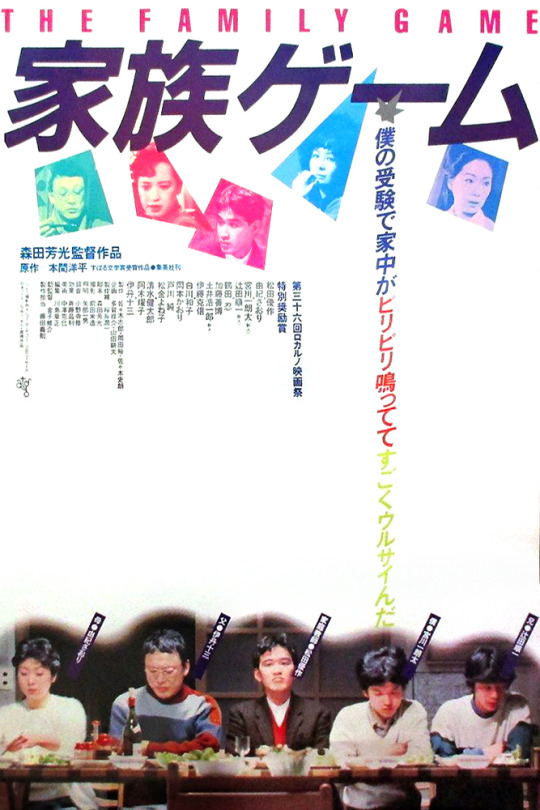
It isn’t until the end of the film when the tutor flips the table, that the family comes face to face with one another for the first time. At first, it appears that no major change is evident. But then we see that the brothers have become closer since they have fallen asleep in the same room. This not only shows the brothers growing closer together, but they are also defying the expectations that they should be hard at work studying. Instead they are doing what they clearly need to do: sleeping. Likewise the mother has also stopped ignoring her surroundings as we notices the helicopter sounds from outside. Then, the mother decides to actually do what she wants to do and not what her husband or society says she should do as a “good housewife” and dimply falls asleep.

In order to make the family actually interact with each other, the tutor uses overly close contact physical touch to get into their spaces - forcing them to take notice. I noticed that this effect worked both for the family members on screen as well as for our viewing class. Everyone was very uncomfortable - but that was the point.
One thing that particularly stuck out to me was the disconnect between the mother and father. He was so cold and constantly shut down everything she had to say or any wants she even minutely expressed. I also found it frustrating how much both parents desperately wanted to shrug off their parental duties and give them to someone else - in this case the tutor.
Overall, I really enjoyed this movie. It was very funny and while at first glance it may seem pointless, there is an actual point. Yoshimoto’s performance also strongly reminded me of Tom Hanks. I’m not quite sure why, but it was a very enjoyable film to watch.
2 notes
·
View notes